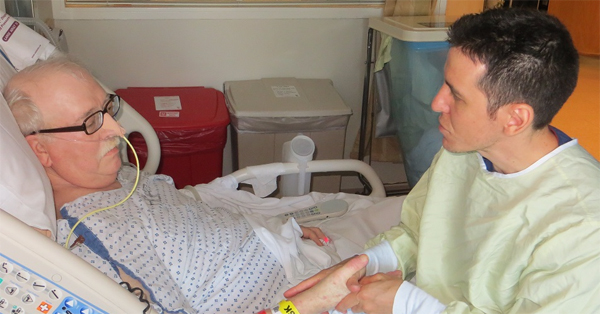Aromatherapy – the therapeutic use of essential oils – has been shown to have a positive impact on various physical and emotional conditions. A recent study showed that laboring women’s anxiety levels decreased after exposure to orange essential oil. Another study showed that lavender helped an elderly population with dementia become calmer. Now, a new aromatherapy program at the Hospital of the University of Pennsylvania is helping patients manage their symptoms…without resorting to medication.
The program, which began in March, offers patients a hand massage with lavender lotion and auto-inhalers containing oils of lavender (to help reduce anxiety or stress), peppermint or ginger (both reduce nausea). These therapies do not replace treatment; it’s complementary. “It’s part of integrative medicine, which is looking at the patient as a whole,” said Christin Reddy, MSN, RN, OCNnurse in an oncology unit at the HUP.
At HUP, aromatherapy is a nursing practice that is part of nursing policy. “It’s something else in a nurse’s toolbox to help manage symptoms that are difficult to manage,” she said. “And aromatherapy does not have the side effects commonly seen with pharmacological interventions.”
Essential oils are plant extracts, each with specific uses. Pure essential oil is extremely concentrated. In fact, a ton of lavender only produces 80 cups of lavender oil! As a result, aromatherapy uses the oils in very small doses, usually through direct inhalation, in a room diffuser, or as a topical treatment. It is rarely ingested. And while it’s important to know when to use which essential oils, it’s essential to know when not use certain oils. For example, peppermint is not safe for pregnant women or for patients with certain types of heart disease. “Not having good information can lead to unsafe uses,” said Susan Kristiniak, DHA, MSN, associate director of palliative care at Penn’s Health System, who has been an aromatherapist nurse for 10 years.
Our sense of smell plays an important role in aromatherapy. Unlike our other senses, smell is the only one that is directly connected to the brain’s limbic system, the area that controls our memories, behavior, and emotions. “Just as certain melodies calm people, certain smells can also be conditioned to a relaxation response,” said Richard Doty, Ph.D., director of the HUP Center for Smell and Taste. And the reaction to smell is rapid. It takes about 0.5 seconds for an odor to register in our brain. Our response to pain is almost double!
Hand massage with lavender lotion causes a relaxation response, but it also has other benefits, such as helping to improve the nurse/patient relationship. “Nurses are present in the moment, chatting with patients as they massage their hands and making a connection,” Reddy said. “It’s an excellent intervention. This allows us to give our full attention to patients. The act of touching also has a calming effect on patients. Nurses also take advantage of massage to educate patients about essential oils.
Auto-inhalers, which patients learn to use, allow them to better control their symptoms, both in the hospital and at home. The “sniffles” can last up to six months.
Patients are invited to evaluate the impact of aromatherapy themselves, before and after therapy. “They rate symptoms like anxiety, nausea and fatigue on a scale of 1 to 10,” said Melissa Trolene, BSN, RN, CMSRN, from an advanced medicine unit of the HUP. Although the program began only a few months ago, “a preliminary literature review by nurses showed that the use of aromatherapy decreased nausea and anxiety when patients self-assessed before and after the experiments,” Kristiniak said. But patient reactions to this new therapy, like the one below, tell the real story.
“A patient came from the emergency room with elevated breathing. He couldn’t speak and was extremely anxious,” Trolene said. Her family stood at her bedside and watched as she massaged her hand with lavender lotion. “I could see his respiratory level go from 60 to 40 to 20. His eyes slowly closed. His family was stunned! When she asked him if he wanted a massage with his other hand, he raised his hand and brought her towards her.
Aromatherapy was initially used in oncology units at HUP, but has since expanded to transplant patients to relieve shortness of breath and to patients receiving outpatient cancer treatment. Kristiniak said they are currently examining its use in women’s health, during childbirth and after childbirth.
Photo caption: Tim Rowan massages James Zogbaum’s hand with lavender lotion to help him relax.
